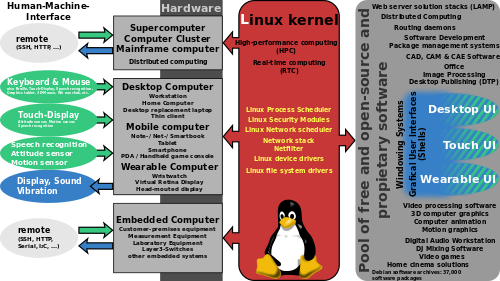11.07.13
Posted in GNU/Linux, Microsoft, Vista 8, Windows at 5:37 am by Dr. Roy Schestowitz
GNU and Linux (which already dominates by its inclusion in the core of Android) are rising

Summary: GNU/Linux may become dominant on the desktop as early as next year, some pundits argue, citing the problems with Vista 8 and the end of Windows XP
Steven J. Vaughan-Nichols, a longtime critic of Microsoft, calls the bugfix release of Vista 8 “more Windows fail,” noting of course what we’ve stressed since last year. Microsoft made too radical a change to Windows, so due to retraining costs it might be worth for businesses to just make the migration to GNU/Linux, not ‘upgrade’ to Vista 8.x. To quote Vaughan-Nichols:
My assessment: Windows 8.1 doesn’t suck as much as Windows 8. If you felt, when using Windows 8, as if you were banging your head against a brick wall, Windows 8.1 might feel as if you’re banging it against a wooden wall. Much better, right? Of course, someday you might ask yourself why you need to bang your head against a wall at all.
Let’s start with Start. Yes, we’ve all heard that Microsoft is bringing the Start button back, responding to all those users shrieking about its disappearance. So that’s better, right? Not so much. All that the new Start button does is bring up the touchy-feely Metro — uh, I mean, Modern — no, wait, make that “Windows 8 Store apps” interface. Is it any wonder that Lenovo bundles the Pokki Start button and menu replacement software with its Windows 8.x machines?
About that interface name: Windows 8 Store apps. Really? Could it be any lamer? Tell me, is there any way Ballmer can be shoved out the door faster?
In the new article “Three signs you’re drinking the Microsoft Kool-Aid” some good points are being made, noting that a lot of people choose to use Windows (or tolerate it being preinstalled) for the wrong reasons. The problem, however, is that the article started with or focuses on the wrong battle — a battle of brands of proprietary software. It says “Mac users have long been criticized for drinking the proverbial Apple Kool-Aid, but as iOS and OS X market share continues climbing, and Microsoft continues hemorrhaging, now might be the time to ask whether you’re drinking the Microsoft Kool-Aid. Here are three sure signs you need to step back, take a deep breath, and re-examine marketplace realities.”
A much better article [1] notes that the “year of the Linux desktop” may be imminent because of the changes Microsoft makes to Windows. A couple of IDG articles [2,3] note that the end of support for XP can make a big difference and that “[f]or the Mac, like the PC, it’s all downhill from here” (“PC” as in Windows). █
Related/contextual items from the news:
-
The “year of the Linux desktop” has been prophesied by Linux supporters almost every year for the last decade. This was once a lofty goal in the Microsoft-dominated enterprise, but times are changing. Linux has grown into a formidable competitor in the smartphone and cloud computing markets, which has caught Microsoft off guard. More importantly, Google, IBM, Red Hat, Facebook, and Netflix have made huge investments into Linux innovations.
-
Should Linux Replace Windows XP?
Windows XP is headed for the scrap heap, should Linux be used to replace it on older computers? TechRepublic takes a look at this question, and comes away with a negative point of view.
-
Permalink
 Send this to a friend
Send this to a friend
Posted in Google, Microsoft, Patents at 5:23 am by Dr. Roy Schestowitz

Summary: The patent troll which Microsoft has created to attack Android/Linux is now doing the predictable and Microsoft (mis)uses legal instruments like DMCA as well
Microsoft is not a scapegoat. Microsoft is a criminal company thriving in bribes, sabotage, litigation, racketeering, etc. For anyone who thinks that Microsoft will die peacefully or has somehow become any more benign than before, there’s news to pay attention to. This post is just a quick summary of events which were mostly covered — fairly well in fact — by other sites.
Here is an accurate assessment of where Microsoft stands right now and what it is trying to do. As FOSS Force put it:
About a month ago we decided to speculate on where Microsoft would be five years down the road. Obviously, the company is in transition and is trying to reinvent itself fast. The traditional desktop market, where Windows dominates, isn’t going anywhere and reports of it’s demise are premature, but it is shrinking and becoming much less important, especially in consumer space.
Well, it oughtn’t neglect how Microsoft tried to reinvent itself as just a racketeering company, making money from other people’s work using patents. “Apple/Microsoft-backed Rockstar Consortium suing Samsung and Google over old Nortel patents Rockstar now owns,” says this article, noting that Nokia too has a role to play:
On the heels of the Apple/Microsoft-backed Rockstar Consortium suing Samsung and Google over old Nortel patents Rockstar now owns, Samsung is tying up patent negotiations on another front. Today Flinland’s Nokia announced that it has extended a patent license agreement with the Korean handset giant for another five years, and that the two had entered into binding arbitration to settle additional compensation related to this, expected to be concluded in 2015.
Microsoft staff that’s just “following orders” says that: “We will know that day has arrived when Microsoft quits threatening every open source project under the sun with patent litigation.”
Well, if he feels this way about Microsoft, then why does he work for Microsoft and help it infiltrate the FOSS community? As FOSS Force put it:
The legal papers were filed by Rockstar Consortium, a patent troll owned by Microsoft, Apple, BlackBerry, Ericsson, and Sony. They hold 6,000 plus patents purchased in an auction for $4.5 billion from bankrupt Canadian telecom Nortel. Google had been bidding against Rockstar for the same patents, but dropped out after placing a $4.4 billion bid that didn’t hold up. Not long afterwards, Google bought Motorola Mobility for $12.5 billion, in large part for its vast patent portfolio–just in case a patent war broke out.
Again, the patent wars have now gone nuclear.
Rockstar is suing Google and just about every manufacturer of Android phones. The suit against Google seems to be mainly against their search technology. The Android makers are accused of infringing on patents dealing with issues such as “Managing a Virtual Private Network” and “System and Method for Notifying a User of an Incoming Communication Event.” To determine infringement, Rockstar engaged in a lot of reverse engineering.
Like all good patent trolls, Rockstar is using everything it can find as a weapon–even Googles $4.4 billion dollar bid to purchase the patents that are now being used against it. Rockstar claims that to be proof that Google already knew it was in violation, paving the way for a finding of willful infringement–meaning damages can be multiplied by three.
Here is what Linux Insider said about it: “Another legal battle between tech titans is brewing. The winners of the Nortel patent bidding war — Microsoft, Apple, et al — have filed a batch of lawsuits against Google and several Android smartphone manufacturers, charging infringement of a number of those patents. Though a good deal of money may change hands, this will be “a road bump in the smartphone wars,” said IP attorney Peter Toren.”
A good take came from TechDirt:
Patent Troll Shell Company Owned By Microsoft And Apple Launches Massive Patent Attack On Android
About a year and a half ago, we wrote about “Rockstar Consortium,” a shell company set up by Apple and Microsoft (and a few other companies), in which they placed many of the patents they received when they outbid Google to get Nortel’s patents. We noted at the time that one of the reasons regulators let Apple, Microsoft, RIM and others team up to buy these patents without it being an antitrust concern was that they promised that all the patents would be able to be licensed on “reasonable terms.” Except… once they handed them off to Rockstar, that company’s CEO, John Veschi, noted that this promise “does not apply to us.”
Microsoft is misusing laws against Google not just when it comes to patents; here is another new example:
Gmail Stays Up as Google Rejects Microsoft DMCA Takedown Notice
While Google receives millions of DMCA notices for its search service every week, that’s not the only part of its system to be targeted by rightsholders. Working on behalf of entertainment companies, over the past year several anti-piracy companies. Microsoft included, have regularly identified and reported URLs used by Google’s Gmail service as infringing copyright. Fortunately, the system hasn’t come crashing down.
For those who say that Microsoft is just worth ignoring it should be made apparent that it’s not GNU/Linux picking on Microsoft; it’s Microsoft that’s constantly picking on GNU/Linux. Any dislike of Microsoft is very much defensive and for Microsoft to be loathed is a well-earned status. We wrote about Rockstar a long time and we foresaw the above action. It’s cartel with racketeering and Apple plays a role in it too, showing its growing proximity to Microsoft. █
Permalink
 Send this to a friend
Send this to a friend
11.03.13
Posted in Action at 3:53 pm by Dr. Roy Schestowitz
Keith B. Alexander still in the NSA…

Summary: CIA-friendly press explains to degree to which the NSA helps the CIA choose bombing targets (suspects and people in their vicinity)
A WEEK or so ago we said that Britain’s worst paper had published an article confirming that the NSA played a role in targeted assassinations using Linux-powered drones. Thousands of people (many innocent civilians) have already been killed in this way, with over a thousand killed by just one 'pilot'. One might say that the NSA is the agency behind these ‘death lists’. Right now, the CIA-friendly Washington Post (owned by strong CIA partner Jeff Bezos) helps confirm what Britain’s worst paper said [1]. The narrative used by the Washington Post is of course self-serving (it is corporate press which rejected important leaks from Bradley Manning), but it sure helps tie together the controversial assassinations and the NSA.
Many privacy advocates have been particularly concerned that young people are now acting as Trojan horses or informants on so-called ‘friends’ and family members (providing gossip and even in-house images with geo-tagging, tagged face recognition, etc.), but fortunately enough this malicious thing called ‘social’ networking (crowdsourced intelligence gathering) is losing popularity among young people [2,3,4]. Let’s hope this trend continues. Whatever makes the NSA weaker makes the majority of society better off. The NSA, as evidence helps show and strongly support time after time, is about protecting the minority who are in power. Rather than protect the public it offers protectionism to the richest 1% and their political agenda. █
Related/contextual items from the news:
-
It was an innocuous e-mail, one of millions sent every day by spouses with updates on the situation at home. But this one was of particular interest to the National Security Agency and contained clues that put the sender’s husband in the crosshairs of a CIA drone.
-
“We did see a decrease in daily users, specifically among younger teens,” Facebook acknowledged. Here’s why that matters.
-
Facebook shares soared 15% Wednesday on blowout quarterly results — but the stock lost steam after the company admitted young teens are losing interest in the site.
-
Facebook’s popularity might be on the decline among some teenagers, the company signaled Wednesday.
For younger teenagers, Facebook has seen a decline in the number of daily users, the company reported during its third-quarter earnings call. Overall, usage among U.S. teens was stable between the second and third quarters, but the decrease in daily usage for some was noted early in the prepared remarks of Facebook’s chief financial officer, David Ebersman.
Permalink
 Send this to a friend
Send this to a friend
Posted in Action at 3:28 pm by Dr. Roy Schestowitz

Summary: How Edward Snowden’s download (copying) of an untold number of unspecified documents (from Microsoft SharePoint) enables everyone in the NSA to leak more documents and attribute this to Snowden (who enjoys asylum)
HERE in Britain, Bonfire Night is already being celebrated by some people. Many let loose their fireworks during the weekend, just before the actual night which is when people work (it’s not a national holiday), so there are explosions outside as I write this. Bonfire Night is about Guy Fawkes, which became famous for the mask of Anonymous, the collective of online activists. Anonymity is a valuable tool for activists. If people can do particular actions without being held accountable for these actions, then that can be used for bad (trolling/cracking) but also for good (whistleblowing/retribution against power). Some — especially the rich and the powerful — try to use the bad cases in order to ban the latter. It helps them keep their power and it helps them keep secret their abuses (if any).
“In a sense, Snowden would be a perfect ‘mask’ for anonymous whistleblowers.”Earlier today, Asher Wolf and many other activists retweeted me saying “Perhaps #snowden is becoming the real-life Guy Fawkes, the anonymous persona through which anonymous leakers claim leaks to have come from” (source).
For context see [1,2] as it suggests that the NSA now has several unknown leakers, whose leaked documents probably get attributed to Snowden in order to protect their jobs. In a sense, Snowden would be a perfect ‘mask’ for anonymous whistleblowers. The NSA does not really know what documents Snowden downloaded to leak to the press (Microsoft SharePoint logging must be defunct), so anything which leaks from the NSA can just be assumed — even wrongly — to have come from Snowden. Suffice to say, it leaves the NSA even more vulnerable. There can be dozens of leakers still working for the NSA, but the NSA cannot know if that’s the case and thus it cannot find out who they are. Snowden gives them the perfect cover. Each NSA whistleblower can just say “I am Edward Snowden” and get away with it when it’s published, leading to another reforming scandal. Maybe one say privacy can be restored thanks to Snowden’s actions [3]. █
Related/contextual items from the news:
-
Jesselyn Radack is a civil liberties attorney with the Government Accountability Project who has been in contact with Edward Snowden. In an ABC News interview, she reported that other NSA insiders have been inspired by Snowden’s bravery and sacrifice and have come forward with further revelations about the organization’s excess, criminality and lawlessness. She says that the Obama administration’s war on whistleblowers has backfired, squandering the administration’s credibility with its own operatives and inspiring them to speak out.
-
But the legal threats and high-level condemnation haven’t kept others from coming forward with new information, Radack said.
“There definitely could be more revelations in addition to those that Snowden has revealed and that are continuing to come out,” she told ABC News.
-
The steady trickle of revelations of government snooping that continues to seep from the Edward Snowden documents is serving to keep attention riveted on how privacy in the digital age ought to be defined.
That’ most probably not to the liking of Google and Facebook. In January 2010, Facebook founder and CEO Mark Zuckerberg infamously declared that the expectation of privacy was no longer a social norm, and, in October 2010, then Google chairman Eric Schmidt said “Google policy is to get right up to the creepy line and not cross it.”
Permalink
 Send this to a friend
Send this to a friend
Posted in Action at 2:54 pm by Dr. Roy Schestowitz

Image credit: AP Photo/Eraldo Peres
Summary: The UK is cheapening terrorism by just equating it with investigative journalism that looks into abuses of international laws
Without independent media, we cannot enforce a law that's adhering to justice as an uninformed public becomes too weak to speak out against those in power (they can rewrite the law to legalise their injustices). Here in the UK we have a chilling war on journalism right now [1, 2, 3, 4, 5]. Threats are being sent to journalists by our ‘elected’ officials and hard-drives are being destroyed on demand for political reasons.
“Threats are being sent to journalists by our ‘elected’ officials and hard-drives are being destroyed on demand for political reasons.”An MI5 whistleblower, the ‘British Snowden’ as some might prefer to refer to her, speaks about the lack of spy oversight [1]. Basically, if you make it illegal to report about spies, then you make it impossible for the public to scrutinise those spies when they break ethical guidelines, violate the law, or put to shame the original contracts that legitimise their budget (taxpayers’ money). The BBC World Service, not a Russian media outlet for a change, gave this ‘British Snowden’ a platform (or a “propaganda platform” as the US State Department might call it).
The latest news from the Snowden saga is that David Miranda, the partner of Glenn Greenwald (Assange equivalent), has been harassed for political reasons [2,3]. Great move, Cameron et al.
A few months ago, after passing the passport control area in Manchester Airport I was hanging around for a bit near two offices used for interrogating people under the pretext of “terrorism”. The doors had a notice on them, alluding to this law which facilitated a vague process as means of “counter terrorism”. It’s a fairly new process. Terrorism as it is described in the media (synonymised these days with radical Islamisation) is not a new thing; what’s new are the laws and the retribution, e.g. drone strikes, long/indefinite detainment without charges, torture for false confessions to be derived, etc. In Britain we had issues with the IRA too, but the same type of actions by Irish militants/extremists did not facilitate harassment of journalists and their family members who are in transit in airports. For the term “terrorist” to be applicable at all, as per the definition of the word, physical violence must be involved. Trying to label leakers and/or their publishers “terrorists” is to merely cheapen the term and over time make it virtually meaningless, just like the term “pirates”. █
Related/contextual items from the news:
-
-
Security services in the United Kingdom have accused David Miranda, the husband of journalist Glenn Greenwald, of being “involved in espionage activity” when he traveled from Berlin to Heathrow Airport on his way back to Brazil, where he lives with Greenwald.
-
The detention of the partner of a former Guardian journalist has triggered fresh concerns after it emerged that a key reason cited by police for holding him under terrorism powers was the belief that he was promoting a “political or ideological cause”.
The revelation has alarmed leading human rights groups and a Tory MP, who said the justification appeared to be without foundation and threatened to have damaging consequences for investigative journalism.
David Miranda is the partner of Glenn Greenwald, the journalist who – often in collaboration with the Guardian – has broken many stories about the extent and scope of spying by the US National Security Agency. Miranda was stopped at Heathrow airport in August and held by the Metropolitan police for nine hours while on his way home to Brazil.
Miranda, it has been claimed, was carrying some 58,000 encrypted UK intelligence documents. He had spent a week in Berlin visiting a journalist, Laura Poitras, who has worked with Greenwald on many of his stories, which have been based on information leaked by the former NSA contractor Edward Snowden.
[...]
Greenwald was equally scathing, tweeting: “UK govt beats its mighty chest, now explicitly equates journalism with ‘terrorism’ and ‘espionage’.”
Permalink
 Send this to a friend
Send this to a friend
Posted in Free/Libre Software, FSF at 2:18 pm by Dr. Roy Schestowitz

Summary: The “DarkMail Alliance” is announced and other options emerge as freedom- and privacy-respecting means of electronic communication
WITH the exception of some projects like Ubuntu, Free software tends to respect users’ privacy and if it doesn’t, then those users can modify the software to remove privacy-violating code (as some Ubuntu derivatives typically do). The NSA scandal received some special coverage in LinuxCon Europe [1] because it is very relevant to GNU/Linux users. There were attempts to put back doors in Linux.
The founder of the FSFE, who moved on to Kolab some years ago, is now using Switzerland’s unique privacy policies to offer users privacy-respecting and freedom-respecting E-mail [2]. He is not alone. There are several companies, including one of the PGP founder (original developer), which now use the demand for privacy-respecting E-mail to create secure alternatives [3,4] (“DarkMail Alliance”). A month from now in Manchester we’ll also have a CryptoParty with the FSFE, helping people configure their machines for improved privacy. My wife and I will be there for help.
The bottom line is, in this age of Microsoft collusion with the NSA we have some very strong arguments with which to persuade people to embrace Free/libre software. It is about human dignity, not just the ability to modify source code, dodge abusive monopolies, and of course save money. My wife, for example, happily uses KDE and Android, knowing that GNU/Linux is now only technically superior to the alternatives but also more respectful towards her human rights. Techrights was recently designed with emphasis on privacy and the next few posts will deal with privacy alone. █
Related/contextual items from the news:
-
Today he is Chief Research Officer at F-Secure in Finland and a just-confirmed keynote speaker for LinuxCon/CloudOpen Europe taking place October 21-23, 2013 in Edinburgh. Hypponen will be talking about the biggest computer security story of the year, that of the NSA and PRISM, in a talk titled “Living in a Surveillance State.” He is also expected to talk about the role the Linux community can play in ensuring the security and privacy of the Internet and mobile devices.
-
-
Silent Circle CTO: “What we’re getting rid of is SMTP.”
-
Dark Mail will provide end-to-end encryption, including email metadata
-
Edward Snowden revelations of mass spying programmes such as PRISM and Tempora show that something needs to be done to protect our private online activities from the prying eyes of GCHQ and the NSA. There’s currently a great deal of interest surrounding these issues and as a result people are seeking to find tools which will help them protect and secure their email, instant messages and web browsing.
This can be done, to an extent, through the use of encryption technology, so on 7th December, we’ll be teaming up with Free Software Foundation Europe to organise a Cryptoparty in Manchester.
Permalink
 Send this to a friend
Send this to a friend
Posted in TechBytes Video at 1:50 pm by Dr. Roy Schestowitz

Direct download as Ogg (00:03:17, 10.8 MB)
Summary: Dr. Richard Stallman, the Free Software Foundation’s founder, speaks about injustices in the US penal system
Made entirely using Free/libre software, heavily compressed for performance on the Web at quality’s expense
Permalink
 Send this to a friend
Send this to a friend
11.01.13
Posted in GNU/Linux, Google at 10:47 am by Dr. Roy Schestowitz

Section of the Whitney umbrella, an example of pinch point singularity
Summary: Android pinches to unzoom Apple’s hypePhone, which was all about hype after all; competition within Android is growing
According to analysis from a Nokia observer [1], Apple is affected profoundly by the rise of Android, which is based on Linux as its kernel. The Nexus 5, with version “KitKat” of Android, is just one of the products that make hypePhone (‘iPhone’) seem overpriced and technically inferior [2]. Hardware support for Android is improving [3] and so are the applications [4,5] and functionality [6]. Security is reasonably strong [7] and Samsung, based on reports [8,9] wants to take Android to another level because there’s increasing competition (Samsung’s Ballnux has become quite expensive and Google helps partners like ASUS or its own Motorola). Little by little, as Android becomes the primary game in town, Apple is becoming the next Nokia. The big competition these days is among brands that sell Android, not between proprietary operating systems (definitely not as they are in the minority). █
Related/contextual items from the news:
-
-
The much hyped 24 October Google Play event turned out to be hoax by some blogger from Geek.com, but there is no doubt the next upgrade to Google’s Nexus phone is due. KitKat is already in work and this is that time of the year – just before the festival season when Google announces its new phones.
-
ARM announced an embedded version of its ARMv8 architecture that will add virtualization and lightweight Linux support to the next of generation Cortex-R processors. The ARMv8-R architecture is 32-bit, but borrows features from the 64-bit ARMv8-A such as hardware-based virtualization and a more advanced MPU, enabling safety-critical embedded applications like automotive computers to run RTOSes, bare metal code, and Linux and Android on a single processor.
-
-
-
-
Until now, Google hasn’t talked about malware on Android because it did not have the data or analytic platform to back its security claims. But that changed dramatically today when Google’s Android Security chief Adrian Ludwig reported data showing that less than an estimated 0.001% of app installations on Android are able to evade the system’s multi-layered defenses and cause harm to users. Android, built on an open innovation model, has quietly resisted the locked down, total control model spawned by decades of Windows malware. Ludwig spoke today at the Virus Bulletin conference in Berlin because he has the data to dispute the claims of pervasive Android malware threats.
-
-
New software tools and a developer confab highlight Samsung’s push to offer something different from all the other Android device makers. Think multiscreen.
Permalink
 Send this to a friend
Send this to a friend
« Previous Page — « Previous entries « Previous Page · Next Page » Next entries » — Next Page »
Further Recent Posts
- Battistelli's Idea of 'Independent' 'External' 'Social' 'Study' is Something to BUY From Notorious Firm PwC
The sham which is the so-called 'social' 'study' as explained by the Central Staff Committee last year, well before the results came out
- Europe Should Listen to SMEs Regarding the UPC, as Battistelli, Team UPC and the Select Committee Lie About It
Another example of UPC promotion from within the EPO (a committee dedicated to UPC promotion), in spite of everything we know about opposition to the UPC from small businesses (not the imaginary ones which Team UPC claims to speak 'on behalf' of)
- Video: French State Secretary for Digital Economy Speaks Out Against Benoît Battistelli at Battistelli's PR Event
Uploaded by SUEPO earlier today was the above video, which shows how last year's party (actually 2015) was spoiled for Battistelli by the French State Secretary for Digital Economy, Axelle Lemaire, echoing the French government's concern about union busting etc. at the EPO (only to be rudely censored by Battistelli's 'media partner')
- When EPO Vice-President, Who Will Resign Soon, Made a Mockery of the EPO
Leaked letter from Willy Minnoye/management to the people who are supposed to oversee EPO management
- No Separation of Powers or Justice at the EPO: Reign of Terror by Battistelli Explained in Letter to the Administrative Council
In violation of international labour laws, Team Battistelli marches on and engages in a union-busting race against the clock, relying on immunity to keep this gravy train rolling before an inevitable crash
- FFPE-EPO is a Zombie (if Not Dead) Yellow Union Whose Only de Facto Purpose Has Been Attacking the EPO's Staff Union
A new year's reminder that the EPO has only one legitimate union, the Staff Union of the EPO (SUEPO), whereas FFPE-EPO serves virtually no purpose other than to attack SUEPO, more so after signing a deal with the devil (Battistelli)
- EPO Select Committee is Wrong About the Unitary Patent (UPC)
The UPC is neither desirable nor practical, especially now that the EPO lowers patent quality; but does the Select Committee understand that?
- Links 1/1/2017: KDE Plasma 5.9 Coming, PelicanHPC 4.1
Links for the day
- 2016: The Year EPO Staff Went on Strike, Possibly “Biggest Ever Strike in the History of the EPO.”
A look back at a key event inside the EPO, which marked somewhat of a breaking point for Team Battistelli
- Open EPO Letter Bemoans Battistelli's Antisocial Autocracy Disguised/Camouflaged Under the Misleading Term “Social Democracy”
Orwellian misuse of terms by the EPO, which keeps using the term "social democracy" whilst actually pushing further and further towards a totalitarian regime led by 'King' Battistelli
- EPO's Central Staff Committee Complains About Battistelli's Bodyguards Fetish and Corruption of the Media
Even the EPO's Central Staff Committee (not SUEPO) understands that Battistelli brings waste and disgrace to the Office
- Translation of French Texts About Battistelli and His Awful Perception of Omnipotence
The paradigm of totalitarian control, inability to admit mistakes and tendency to lie all the time is backfiring on the EPO rather than making it stronger
- 2016 in Review and Plans for 2017
A look back and a quick look at the road ahead, as 2016 comes to an end
- Links 31/12/2016: Firefox 52 Improves Privacy, Tizen Comes to Middle East
Links for the day
- Korea's Challenge of Abusive Patents, China's Race to the Bottom, and the United States' Gradual Improvement
An outline of recent stories about patents, where patent quality is key, reflecting upon the population's interests rather than the interests of few very powerful corporations
- German Justice Minister Heiko Maas, Who Flagrantly Ignores Serious EPO Abuses, Helps Battistelli's Agenda ('Reform') With the UPC
The role played by Heiko Maas in the UPC, which would harm businesses and people all across Europe, is becoming clearer and hence his motivation/desire to keep Team Battistelli in tact, in spite of endless abuses on German soil
- Links 30/12/2016: KDE for FreeBSD, Automotive Grade Linux UCB 3.0
Links for the day
- Software Patents Continue to Collapse, But IBM, Watchtroll and David Kappos Continue to Deny and Antagonise It
The latest facts and figures about software patents, compared to the spinmeisters' creed which they profit from (because they are in the litigation business)
- 2016 Was a Terrible Year for Patent Trolls and 2017 Will Probably be a Lot Worse for Them
The US Supreme Court (SCOTUS) is planning to weigh in on a case which will quite likely drive patent trolls out of the Eastern District of Texas, where all the courts that are notoriously friendly towards them reside
- Fitbit’s Decision to Drop Patent Case Against Jawbone Shows Decreased Potency of Abstract Patents, Not Jawbone’s Weakness
The scope of patents in the United States is rapidly tightening (meaning, fewer patents are deemed acceptable by the courts) and Fitbit’s patent case is the latest case to bite the dust
- The EPO Under Benoît Battistelli Makes the Mafia Look Like Rookies
Pretending there is a violent, physical threat that is imminent, Paranoid in Chief Benoît Battistelli is alleged to have pursued weapons on EPO premises
- Links 29/12/2016: OpenELEC 7.0, Android Wear 2.0 Smartwatches Coming
Links for the day
- Links 28/12/2016: OpenVPN 2.4, SeaMonkey 2.46
Links for the day
- Bad Service at the European Patent Office (EPO) Escalated in the Form of Complaints to European Authorities/Politicians
A look at actions taken at a political level against the EPO in spite of the EPO's truly awkward exemption from lawfulness or even minimal accountability
- No “New Life to Software Patents” in the US; That's Just Fiction Perpetuated by the Patent Microcosm
Selective emphasis on very few cases and neglect of various other dimensions help create a parallel reality (or so-called 'fake news') where software patents are on the rebound
- Links 27/12/2016: Chakra GNU/Linux Updated, Preview of Fedora 26
Links for the day
- Leaked: Letter to Quality Support (DQS) at the European Patent Office (EPO)
Example of abysmal service at the EPO, where high staff turnover and unreasonable pressure from above may be leading to communication issues that harm stakeholders the most
- Negative Publicity (Personal or by Association With the EPO) is Devouring the Institution
Willy Minnoye, Ciarán McGinley, Lionel Baranès, Theano Evangelou and others near the top of the EPO pyramid recalled in light of old news about them
- 2017 Will be the Year Team Battistelli Collapsed and EPO 'Reform' Became All About Detoxifying the Organisation
Battistelli's circle (or "Team Battistelli") is starting to disintegrate, perhaps in anticipation of a tough year full of new leaks ("WillyLeaks" as some put it)
- With the Demise of Software Patents and Likely Soon Patent Trolls (Based on SCOTUS), Trump Appointments Matter Even More
In light of Trump's awkward history with judges (e.g. attacking them) one can hope that upcoming patent cases at the highest court won't be affected by his pro-big corporations agenda

























 Content is available under CC-BY-SA
Content is available under CC-BY-SA